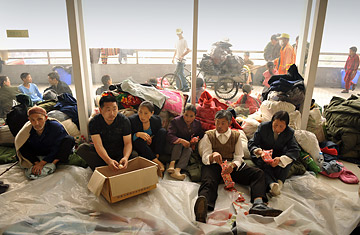
Refugees from the earthquake in China gather at aa stadium in Mianyiang.
If you end up at the Jiuzhou Stadium in Mianyang, you've probably lost everything. Thousands of people displaced by the Sichuan earthquake now sleep here in tents or under the stadium's roof, and jostle for places in line for the sliced cucumbers and congee dished out by volunteers. Like many others here, Chen Jigui, 41, came from the city of Beichuan. He arrived the day after the May 12 earthquake destroyed his home. Despite his uncertainty over the future, Chen is grateful for the attention he and other quake victims have received from the government. President Hu Jintao and Premier Wen Jiabao visited the disaster zone to inspect the destruction, console victims and encourage rescuers. "It means a lot to us common people when they come and visit us down at the basic level," says Chen. "We feel a sense of relief." And, at least for a moment, so can China's Communist Party leadership.
The quake's death toll has passed 60,000, with nearly 25,000 still missing. Saturday, the government said those figures may yet continue to soar, with a final death toll surpassing 80,000. Whole towns have been rendered uninhabitable, and more than 5 million people are homeless. Rebuilding the disaster zone will take years. But for Beijing, whose disaster recovery efforts are critical to maintain its legitimacy in the eyes of the Chinese public, the initial response to the temblor will be counted as a success. "This is the 'people's government', and so the people's government performed," says David Zweig, director of the Center on China's Transnational Relations at the Hong Kong University of Science and Technology.
Much of the credit has been heaped on Premier Wen, who flew to the disaster zone shortly after the earthquake, and crisscrossed the region. Wen was omnipresent on state television, demanding that blocked roads to stricken towns be opened, and urging on maximum efforts directed at saving lives. At times the 65-year-old leader sounded angry, depressed and exhausted. His voice cracked on occasion, but that was seen as a sign of sincerity rather than weakness. And his efforts earned the appreciation of many in the region. "His spirit is really great," says Feng Jianyun, 34. "Of course we could do the recovery work without him, but he gives us a kind of inspiration. With a disaster of the size, we wouldn't know what to do on our own."
The deployment of some 130,000 soldiers and paramilitary troops in the rescue effort has also earned plaudits. Units of the People's Liberation Army and People's Armed Police could be seen repairing roads and holding back anguished relatives from flattened schools, sometimes even removing rubble by hand to assist rescue efforts. Of course, there were many limitations on the effectiveness in disaster relief of security forces with little expertise in the field. For the first two days, rain and cloud cover prevented PLA helicopters from reaching the devastated town of Wenchuan, and troops had to walk there. But, says Richard A. Bitzinger, a senior fellow at the Nanyang Technological University in Singapore, the symbolic value of the presence and effort of the security forces has been more important than its technical effectiveness.
"It's not that they don't want to help, it's just they are not organized effectively," says Bitzinger. "But that's not the point. This is a don't-just-stand-there-do-something kind of response. People hear that the army is being mobilized for a good cause. A lot of this is p.r."
As the last miracle survivors are pulled from the rubble more than a week after earthquake, the focus will move to rebuilding the devastated region. And that will likely tarnish the glow on the authorities' initial response. Some of those commenting on Chinese web forums have questioned why foreign rescue teams where initially turned away. Precious time was lost as the government waited several days before allowing expert teams from South Korea, Japan, Russia and Singapore into the disaster zone. "Those foreign rescuers aren't gods," wrote one commenter on a Tianya forum. "Maybe their work is limited to towns and cities out of national security considerations. But if they can save a few people, a few dozen people, a few hundred people, isn't that enough?"
Even more challenging for the central government will be the issue of corruption. Many parents who lost children in collapsed schools believe that graft and substandard construction are to blame. Beijing has promised an investigation into why an estimated 7,000 schools were destroyed. If such a probe nabs only a few low-level officials, the government risks angering parents with little to lose and the support of the nation behind them.
On Thursday, the government announced it would allocate $10 billion for recovery efforts, and called for 3.3 million tents to add to the 400,000 already in the disaster zone. Beijing has instructed local officials to build 1 million temporary structures by August, according to the state-run Xinhua News Agency. "Whenever you see that amount of money accumulate, there's always a chance local officals will try to get their hands on it," says Zweig. "I think the government has got to be careful that the money that people contributed actually contributes to improving the people's lives." Otherwise, China could end up rebuilding structures every bit as dangerous as the ones destroyed in the quake.
—With reporting by Lin Yang
